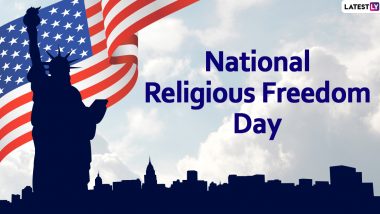Every year, the National Religious Freedom Day is celebrated in the United States of America (USA) on January 16. On this day in 1786, soon after the United States of America (USA) came into existence as a sovereign nation, the Virginia General Assembly adopted Thomas Jefferson’s landmark Virginia Statute for Religious Freedom. Beginning in 1786, a statement is released on this day every year by the president of the United States officially proclaiming Religious Freedom Day. Religious Freedom Day was first proclaimed in 1996 and has been proclaimed every year since then by a statement by the President of the USA. This day is aimed to protect and promote religious expression rights of all the Americans.
National Religious Freedom Day History
The Virginia State Assembly adopted the Virginia Statute for Religious Freedom on January 16, 1786. The Statute was drafted by Thomas Jefferson in 1777. As a result of this, the Church of England in Virginia was disestablished and people of different faiths were granted freedom of religion. Due to this, Catholics, Protestants and Jews were all given equal rights to express their religious beliefs.
Significance of National Religious Freedom Day
The special day commemorates the Virginia General Assembly’s adoption of Thomas Jefferson’s landmark Virginia Statute for Religious Freedom on January 16, 1786. The special day calls upon the people of America to “observe this day through appropriate events and activities in homes, schools, and places of worship.”
Celebrations of National Religious Freedom Day
On the Religious Freedom Day, people of America celebrate the country's long‑standing commitment to freedom of conscience and the freedom to profess one’s own faith. On January 16, 1786, Virginia enacted the Statute for Religious Freedom to protect the right of individual conscience and religious exercise. The Stature for Religious Freedom also prohibits the compulsory support of any church.
The statute, authored by Thomas Jefferson, set forth the principle that religious liberty is an inherent right and not a gift of the state. It served as the inspiration and model for the legal architecture of the conscience protections in the First Amendment, drafted by James Madison just a few years later. The right to religious freedom is innate to the dignity of every human person and is foundation to the pursuit of truth.
(The above story first appeared on LatestLY on Jan 16, 2020 08:40 AM IST. For more news and updates on politics, world, sports, entertainment and lifestyle, log on to our website latestly.com).













 Quickly
Quickly


